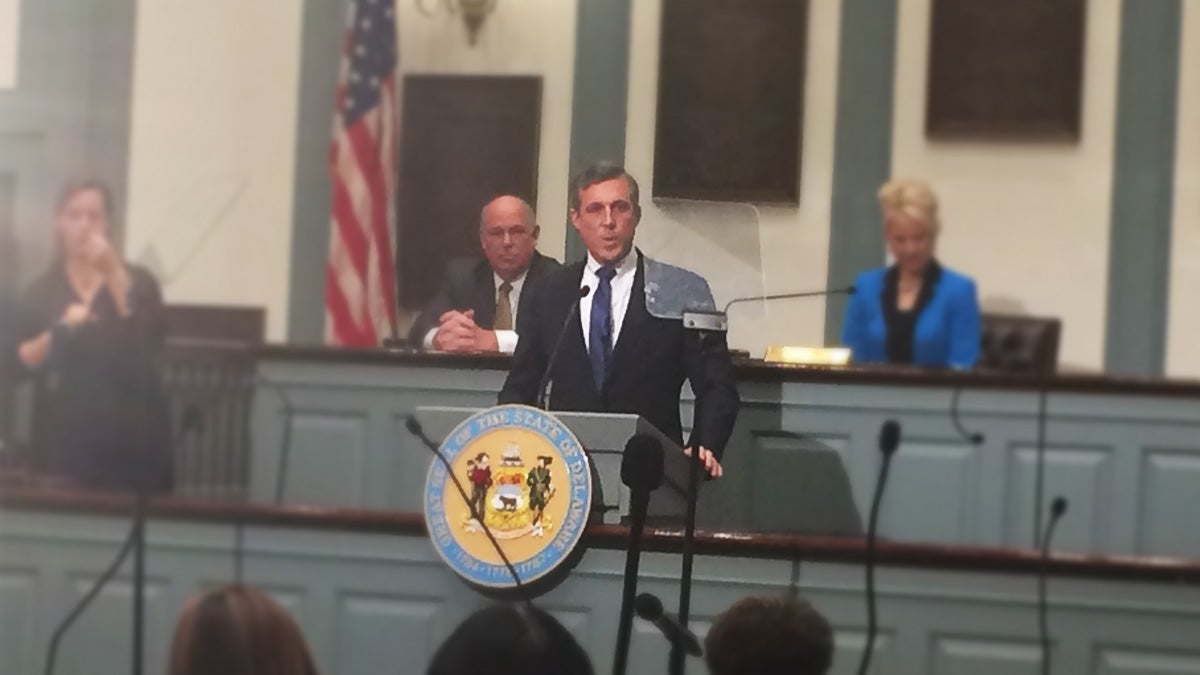Governor Carney proposes solution to state’s $400 millon budget deficit

Delaware governor proposes what he believes will make the state more competitive in the 21st century.
The state finances is a major concern for Gov. John Carney who addressed the General Assembly about costs, taxes and more on Thursday in Dover. The meeting comes weeks after Carney made several trips throughout the state to discuss Delaware’s $400-million budget deficit and a solution.
“We all seemed to agree on one thing: business as usual has to change. If we are going to tackle the tough issues that confront us, we need to get our financial house in order,” Carney said.
According to the governor a budget reset is the only way to fix the state’s money issues.
“I’ve proposed an operating budget that grows government spending less than three-tenths of one percent. It contains a 50-50 mix of spending cuts and new revenue,” said Gov. Carney who added that his proposal is built on the principle of shared sacrifice.
There appeared to be one question the governor and his team asked themselves as they reviewed what programs to cut and preserve.
“How will this decision impact our ability to grow our economy and compete,” said Carney during his speech. The question also helped leaders decide which taxes to raise and leave untouched.
EDUCATION
The challenge didn’t stop with taxes though. Education required much attention from Delaware leaders regarding improvement.
“Our dreams for our children’s future don’t disappear because of a budget crisis,” Carney said.
However, very little details were provided on the subject since the Department of Education Secretary Susan Bunting is still working to reorganize education by visiting schools to learn more about the needs of students and teachers.
“Our solution will not be one size fits all. We will be coming back to the legislature and school communities with our plan to reform the Department of Education,” Carney said.
The governor said no new spending in education is planned at the time but an investment could help vulnerable students statewide.
“My budget includes a down payment on Education Opportunity Grants, a program that will direct more resources to our neediest students,” Carney said.
Earlier this month Carney sat down with the Wilmington Education Improvement Commission that proposed a redistricting plan, which meant pulling students from the Christina School District and sending them to Red Clay School District. Gov. Carney doesn’t believe that plan is financially feasible. However WEIC calls the plan a possible solution to help low performing schools and students in the city of Wilmington often left out.
“The debate over district boundaries in New Castle County has been raging for years, and we will continue to engage on those issues. But we should not allow the politics of redistricting to distract us. This is about the kids. We need to incentivize innovation in the classroom, and we need to start now,” Carney said.
Still in the arena of helping Delaware’s children, Carney re-established the Family Services Cabinet Council. It’s designed to assist families in a number of areas from child care costs to poverty. The group plans to meet next week.
ECONOMY
Then there’s the economy. The governor added that another way to improve the fiscal crisis is to grow and strengthen the economy.
“The Delaware Economic Development Office needs to be at the forefront of moving Delaware into the 21st century economy. So my first act as governor was to find a way to energize our economic development efforts. We’re going to do that by bringing private sector involvement into DEDO,” Carney said.
In order to put the public private partnership to work right away, Carney stressed the need to create job growth projects and support with companies such as Incyte, Zip Code Wilmington and the Horn Program at the University of Delaware, Star Campus and the Delaware Technology Park.
“One of the best ways to create those jobs is to redevelop existing facilities that are unused or underutilized. That’s what’s taking place right now with JP Morgan’s reuse of buildings once owned by Astra Zeneca,” said Gov. Carney who added that leaders are also working to turn space at the DuPont Experimental Station into an economic driver for the state.
The list goes on in regards to redevelopment projects and ideas. Carney speech also mentioned plans to redevelop sites like the old steel plant in Claymont and the General Motors auto plant in Newport. Carney pointed to the Port of Wilmington’s recent purchase of the Chemours site at Edgemoor as an example of current redevelopment activity.
As part of his efforts to promote economic growth, Carney called for revising the Coastal Zone Act, which restricts business development near the ocean. He urged “reasonable change” that could spur the economy while still protecting coastal areas.
Briefly, Carney addressed opioid sales and the abuse of it in the state. Carney said it contributes to Delaware’s tragic heroin problem as a result in April new protections will be imposed regarding opioids prescriptions.
“Working with Attorney General Denn, we have introduced new legislation to allow expanded use of the state’s prescription database to better target doctors who overprescribe,” Carney said. He vowed to continue work to increase the availability of residential treatment, recovery homes, and expanded services for outpatient treatment slots.
Finally, nearly two weeks into Carney’s term, a correctional officer was killed after inmates took over a prison in Smyrna. Carney referenced the incident, but is still working on how to prevent it from happening again.
“I will receive recommendations by June 1st and work quickly with leaders of the correctional committee and House and Senate and create a plan of action. The report will not collect dust on a shelf.”
The General Assembly will review Carney’s proposal. A Delaware budget must be approved by June 30th.
“It’s our responsibility to keep our state a great place to live and work and raise a family. A state ready to compete in the economy of the 21st century,” Carney said.
WHYY is your source for fact-based, in-depth journalism and information. As a nonprofit organization, we rely on financial support from readers like you. Please give today.




